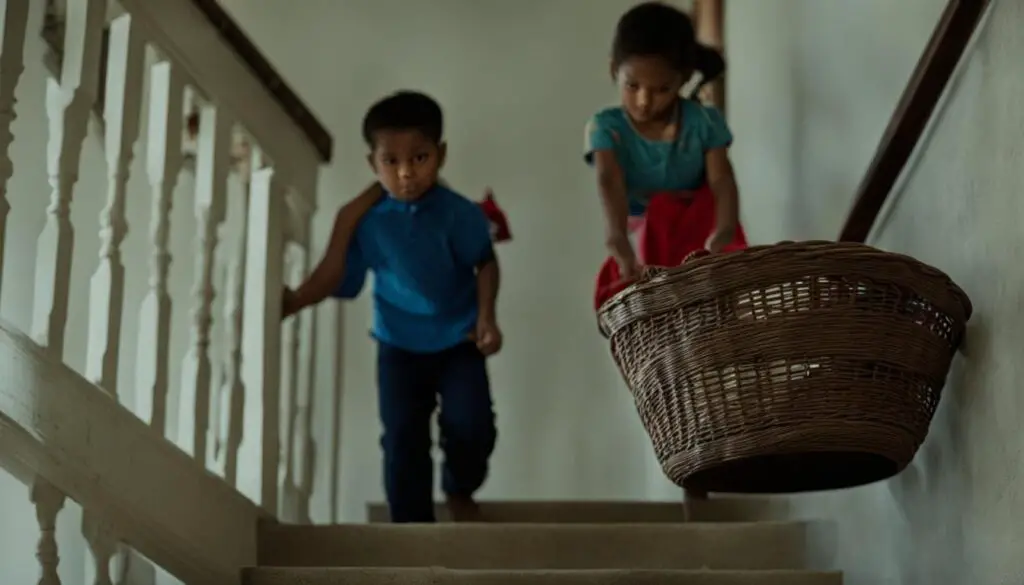
Fostering Independence in Your Children
As parents, it’s crucial to foster independence in our children. By teaching them to be self-reliant and encouraging their autonomy, we equip them with the necessary skills for success in life. While it may be tempting to shelter them from mistakes and difficulties, allowing them to navigate challenges on their own is vital for their growth and development.
Strategies for promoting independence in children can start with simple daily activities. From an early age, encourage them to take responsibility for their own tasks, such as dressing themselves, tidying up their toys, and even helping with basic household chores. By giving them the space to learn and the freedom to make decisions, we empower them to become confident, self-reliant individuals.
Key Takeaways:
- Teaching children to be independent helps develop resilience and a growth mindset.
- Allowing children to make mistakes and learn from them builds self-esteem and decision-making skills.
- Assigning age-appropriate chores fosters responsibility and a sense of contribution.
- Offering choices and encouraging decision-making empowers children to take ownership of their actions.
- Providing opportunities for independent exploration boosts confidence and self-reliance.
Teaching Children to Think for Themselves
Allowing children to make mistakes and learn from them is crucial for their development. It’s through these mistakes that they acquire valuable life skills such as independence, resilience, and a growth mindset. By embracing mistakes as learning opportunities, we encourage our children to think for themselves and make informed choices in the future.
Teaching independence is not limited to major life decisions but can also be applied to everyday situations. For example, when a child forgets their umbrella on a rainy day, instead of rescuing them, we can encourage them to find a solution on their own. By doing so, we empower them to problem-solve and take responsibility for their actions.
“Mistakes are proof that you are trying.” – Anonymous
When children encounter more significant mistakes, like failing a test, it’s important to provide a supportive environment where they can learn from their failures. Instead of dwelling on the negative outcome, we can help them analyze what went wrong and develop strategies for improvement. This approach nurtures a growth mindset, where children understand that their abilities can be developed through dedication and hard work.
Furthermore, learning from mistakes builds resilience and self-esteem in our children. When they experience setbacks, they learn to bounce back and persevere through challenges. This resilience not only helps them academically but also prepares them for the inevitable obstacles they will encounter throughout their lives.
In conclusion, teaching children to think for themselves and learn from their mistakes is essential for their growth and development. By embracing mistakes as learning opportunities, we foster independence, resilience, and a growth mindset. Let’s empower our children to make their own choices and embrace the valuable lessons that come from both successes and failures.
Growth Mindset vs. Fixed Mindset
| Fixed Mindset | Growth Mindset |
|---|---|
| Believes abilities are fixed and cannot change | Believes abilities can be developed through effort and practice |
| Avoids challenges and gives up easily | Embraces challenges and persists through obstacles |
| Views failure as a reflection of their worth | Sees failure as an opportunity to learn and grow |
| Avoids feedback and criticism | Valuates feedback and uses it to improve |
| Feels threatened by the success of others | Is inspired by the success of others |
Giving Age-Appropriate Chores
Assigning children age-appropriate chores is a powerful way to teach them responsibility and instill a sense of contribution to the household. By involving children in tasks that align with their abilities, parents can foster their development and help them become responsible individuals.
When it comes to age-appropriate chores, it’s important to consider the capabilities and maturity level of each child. Giving them tasks that they can successfully complete builds their self-confidence and allows them to take ownership of their environment.
Here are some examples of age-appropriate chores:
| Age Group | Chores |
|---|---|
| 2-4 years |
|
| 5-7 years |
|
| 8-10 years |
|
| 11-13 years |
|
Assigning these age-appropriate chores not only helps children develop a sense of responsibility but also teaches them important life skills. It allows them to contribute to the household and understand the value of hard work and teamwork. Moreover, completing chores gives children a sense of accomplishment and independence.

By giving children age-appropriate chores, parents are nurturing their development and teaching them the importance of contributing to the household. This approach not only builds responsibility but also empowers children to become self-reliant and capable individuals.
Offering Choices and Encouraging Decision-Making
A key aspect of fostering independence in children is empowering them with choices and encouraging decision-making. By allowing children to make decisions and experience natural consequences, parents can build their decision-making skills and promote self-reliance. Providing choices within reasonable options helps children think on their feet and take responsibility for their choices.
When offering choices, it’s important to remember that children thrive when offered guidance and scaffolding. By setting clear boundaries and offering age-appropriate options, parents can help children navigate decision-making without feeling overwhelmed. For example, a parent can offer choices like “Would you like to wear the blue shirt or the red shirt today?” or “Would you like carrots or broccoli with dinner?” This approach allows children to make decisions while still providing the necessary guidance.
“Allowing children to make choices empowers them and fosters their decision-making skills. By experiencing both positive and negative consequences of their choices, children learn to take ownership of their decisions and become more independent.”
Through the process of making choices and experiencing the natural consequences, children learn valuable lessons that will serve them well in the future. They begin to understand the cause-and-effect relationship between their decisions and the outcomes. This helps them develop critical thinking skills, evaluate options, and make informed choices.
Benefits of Offering Choices and Encouraging Decision-Making
Empowering children with choices and encouraging decision-making has several benefits:
- Builds confidence and self-esteem
- Enhances problem-solving and critical thinking skills
- Develops a sense of responsibility and accountability
- Promotes independence and self-reliance
- Helps children learn from both positive and negative consequences
By offering choices and encouraging decision-making, parents provide their children with opportunities to learn and grow. This approach nurtures their autonomy and strengthens their decision-making skills, setting them up for success in various aspects of life. It also teaches them to take responsibility for their choices and actions, an essential life skill.

Allowing Independent Exploration
Giving children the space to explore independently is a crucial aspect of fostering their self-reliance. By allowing them to play in another room, walk a little ahead on the sidewalk, or run errands with appropriate supervision, we provide them with the opportunity to develop confidence and independence. Encouraging them to accomplish small tasks on their own, such as hanging up their coat or repacking their lunch, boosts their self-reliance and reinforces their ability to tackle everyday challenges.
Independent exploration not only helps children become more self-sufficient but also allows them to learn valuable life skills. When they are given the freedom to explore their surroundings, they gain a sense of autonomy and the ability to problem-solve. They learn to navigate their environment, make decisions, and discover their personal interests and passions.
Research has shown that independent exploration promotes cognitive development. When children are given the freedom to explore and learn at their own pace, they become actively engaged in the learning process. They learn to think critically, ask questions, and seek answers. This type of self-directed learning enhances their creativity, problem-solving abilities, and overall cognitive abilities.
“Independent exploration gives children the space to learn and grow, fostering their self-reliance and independence.”
Benefits of Independent Exploration
- Development of problem-solving and critical thinking skills
- Enhanced creativity and imagination
- Increased self-confidence and self-esteem
- Opportunity for self-discovery and personal growth
- Improved decision-making abilities
- Strengthened sense of autonomy and independence
By providing children with the space to learn through independent exploration, we are equipping them with the skills necessary to become self-reliant individuals. It is important as parents to balance supervision and guidance with the freedom for them to explore and learn on their own.
| Age Group | Activities for Independent Exploration |
|---|---|
| Preschool (3-5 years) |
|
| Elementary (6-10 years) |
|
| Tween/Teen (11-18 years) |
|
Encouraging independent exploration sets the stage for lifelong learning and growth. By giving our children the space to learn and discover on their own terms, we are empowering them to become self-reliant individuals who can navigate the complexities of the world with confidence.
Supporting Independence in Daily Activities
When it comes to fostering independence in our children, it’s crucial to avoid overcorrection and provide them with opportunities to tackle tasks on their own. By focusing on their efforts and acknowledging their responsibility, we can build their confidence and self-reliance.
Organizing the physical space around them is equally important in supporting their independence. By making the environment accessible and creating opportunities for children to perform daily activities independently, such as reaching their cups, packing their lunch, and taking care of their personal hygiene, we empower them to take ownership of their daily routines.
It’s important to remember that independence is a process. It’s normal for children to struggle, make mistakes, and learn from them. As parents, our role is to guide and provide support rather than fixing their efforts. This allows them to develop problem-solving skills and become more self-sufficient over time.
Creating a Supportive Environment
One way to support independence in daily activities is by organizing the physical space in a way that encourages children to take on tasks without constant supervision. Here are some practical strategies:
- Arrange items within their reach: Store frequently used items, such as cups, plates, and snacks, in accessible cabinets or shelves to encourage children to retrieve and use them independently.
- Create a designated area for personal care: Set up a child-friendly area in the bathroom or bedroom where children can easily access their toothbrush, comb, and other personal care items. This helps them take responsibility for their hygiene routine.
- Provide child-sized furniture and tools: Having furniture and tools that are appropriate for their size and abilities enables children to actively engage in daily activities, like setting the table or tidying up their room.
Encouraging Responsibility
It’s important to give children age-appropriate responsibilities and allow them to take on tasks independently. This helps develop their sense of responsibility and self-confidence. Here are some ways to encourage responsibility:
- Assign age-appropriate chores: Delegate tasks that match their abilities and gradually increase their responsibilities as they grow older. This could include making their bed, folding laundry, or helping with meal preparation.
- Encourage independence in self-care: Guide children in developing personal care routines, such as dressing themselves, brushing their teeth, and packing their own school bag. Provide support and praise their efforts along the way.
- Teach them basic life skills: Introduce skills like time management, organization, and problem-solving through age-appropriate activities. This could involve planning their own schedule, organizing their belongings, or solving simple puzzles.
By supporting independence in daily activities, we equip our children with skills that will serve them well throughout their lives. They will grow into self-reliant individuals who are confident in their abilities to handle tasks, make decisions, and navigate the world around them.
“Independence is not a goal to be reached; it’s a journey to be embraced.”
Conclusion
Fostering independence in children is essential for their growth into confident and self-reliant adults. By allowing them to make mistakes, giving them age-appropriate responsibilities, offering choices, encouraging independent exploration, and supporting their independence in daily activities, parents can help their children develop crucial skills for a successful future.
Allowing children to make mistakes and learn from them fosters a growth mindset and resilience. By embracing mistakes as learning opportunities, children build self-esteem and the ability to make informed choices in the future. Assigning age-appropriate chores not only teaches responsibility but also instills a sense of contribution to the household and a proactive mindset.
Offering choices and encouraging decision-making empowers children to think for themselves and take responsibility for their choices. Experiencing natural consequences teaches them valuable lessons and strengthens their decision-making skills. Independent exploration, with appropriate supervision, allows children to build confidence and self-reliance. Supporting their independence in daily activities boosts their confidence and fosters a sense of accomplishment.
By actively and confidently fostering independence in children, parents play a significant role in building self-reliant adults. These strategies for independence in parenting help children develop the necessary skills and mindset to navigate the challenges of adulthood and thrive in their personal and professional lives.
FAQ
Why is fostering independence in children important?
Fostering independence in children is important because it helps them develop crucial skills such as resilience, self-esteem, and the ability to make informed choices. It also contributes to their growth into confident, self-reliant adults.
How can I teach my children to think for themselves?
Teaching children to think for themselves involves allowing them to make mistakes and learn from them, embracing mistakes as learning opportunities, and encouraging a growth mindset. This mindset shift helps children develop resilience and the ability to cope with adversity.
What are some age-appropriate chores I can assign to my children?
Some age-appropriate chores you can assign to your children include cleaning up toys, helping with groceries, and picking up their room. Assigning chores not only helps them develop a sense of responsibility but also makes them feel like a valuable contributor to the household.
How can I empower my children and encourage their decision-making skills?
You can empower your children and encourage their decision-making skills by allowing them to make decisions and experience natural consequences. Providing choices within reasonable options helps them think on their feet and take responsibility for their choices.
How can I promote independent exploration in my children?
Promoting independent exploration in children involves giving them space to explore without constant supervision. Allowing them to play in another room, walk a little ahead on the sidewalk, or run errands with sufficient supervision helps them build confidence and self-reliance.
How can I support my children’s independence in daily activities?
You can support your children’s independence in daily activities by avoiding overcorrection and allowing them to tackle tasks independently. Instead of fixing their efforts, focus on the fact that they took on the responsibility. Organizing spaces to be accessible and providing opportunities for children to do things on their own fosters independence.
What are the benefits of fostering independence in children?
Fostering independence in children has many benefits. It helps them develop crucial skills such as resilience, self-reliance, and the ability to make informed choices. It also contributes to their growth into confident, self-reliant adults.
Source Links
- https://childmind.org/article/how-to-build-independence-in-preschoolers/
- https://www.parents.com/kids/development/little-things-you-can-do-every-day-to-make-your-child-more-independent/
- https://www.scholastic.com/parents/family-life/social-emotional-learning/social-skills-for-kids/how-to-foster-independence.html